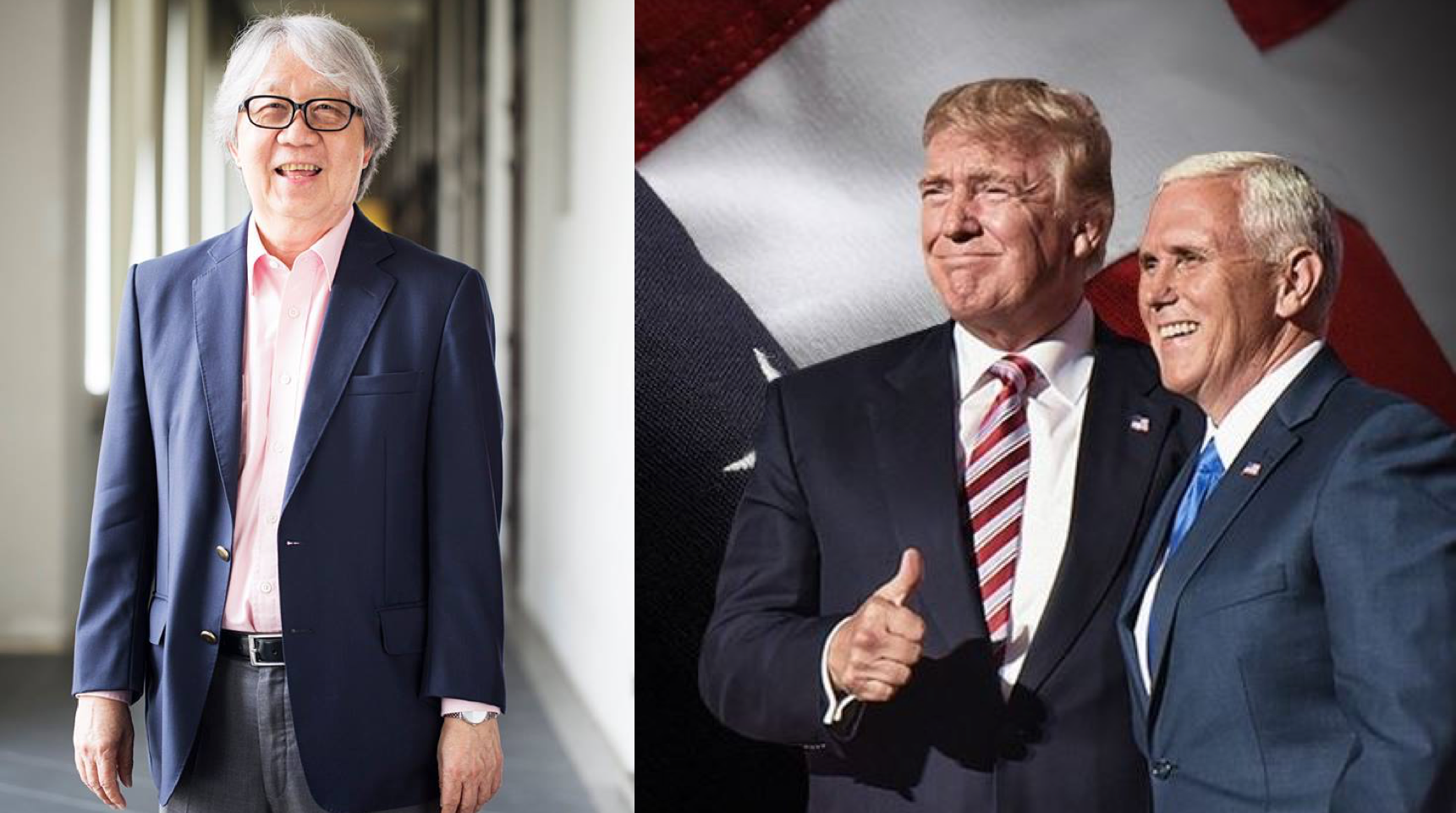Professor Tommy Koh threw a curveball at United States officials at a conference on Nov. 15.
He asked:
"If Asia matters to America, why is your leader, President Trump, not here?"
Koh, Singapore's Ambassador-at-large, was speaking at an event organised by the S. Rajaratnam School of International Studies and the Washington-based East-West Center.
The Straits Times reported that Trump administration officials were present, including Acting US Assistant Secretary of State Patrick Murphy and the top US diplomat to ASEAN, Charge D'affaires Piper Campbell.
President Trump not in Singapore
Koh was referring to the fact that it was Vice-President Mike Pence, not President Trump, who was representing the US at the ASEAN-US meeting and the East Asia Summit, both held in Singapore.
President Trump had embarked on a lengthy tour of East Asia in 2017, visiting Tokyo, Seoul, Beijing, Manila and Hanoi.
But he had decided to skip the summit in 2018 -- despite the presence of other world leaders like President Vladimir Putin of Russia, Prime Minister Narendra Modi of India, and President Moon Jae-in of South Korea.
Disputing the point, Campbell told Koh not to downplay Vice-President Pence's importance:
"Do not diminish the importance of Mr Pence being here."
Campbell added that Pence had been active in furthering relations between the US and Southeast Asia.
She cited his trip to Jakarta, Indonesia in 2017, where he visited the ASEAN Secretariat and his meeting with ASEAN leaders at the United Nations in New York in September 2018.
Vice-President Pence did speak on regional affairs while in Singapore, criticising Myanmar leader Aung San Suu Kyi for the Rohingya refugee crisis.
He said:
"I am anxious to hear the progress that you are making of holding those accountable who are responsible for the violence that displaced so many hundreds of thousands and created such suffering, including the loss of life".
Exclusion of China?
Koh also questioned a specific term that President Trump used at the APEC Summit in 2017.
Back then, he had referred to the US vision of a "free and open Indo-Pacific".
Koh pointed out that the more commonly used term was "Asia-Pacific". Said Koh:
"I am not comfortable with the US abandoning a concept that we know and have used for many years - the Asia-Pacific."
He asked if the term was ideological, as it appeared to be driven by countries which are democracies. Said Koh:
"This appears to be driven by the so-called quad countries - the US, Japan, Australia, which are allies, and India. These are democracies.
Many of us feel a slight discomfort because if it is ideological in content, is it intended to exclude countries which are not democracies? Is the strategic intent targeted at excluding China?
If that is the intent, then we are not comfortable because we in ASEAN want a regional order that is open and inclusive."
Ideology can serve regional interests
The Quad is an unofficial grouping, but officials from each of the four countries held a meeting in Singapore on Nov. 15.
In response, Satu Limaye of the East-West Centre said the "Indo-Pacific vision" meant certain norms, like US respect for national sovereignty.
This was contrasted with China's policies of supposedly unsustainable loans which created so-called "debt traps" for some of China's trade partners. Said Limaye:
"If that is what is meant by ideology, that serves the interests not just of the US, but also the region."
Trade war
Koh also raised the issue of President Trump's trade war.
The US has imposed tariffs on imports of certain Chinese goods, citing a trade deficit, which prompted President Xi Jinping of China to do the same.
Koh pointed out that Asian countries were concerned that the US under President Trump's direction had upset the previous order which had fostered prosperity through a free exchange of goods, services, and technology.
Campbell responded, saying that the US was trying to make free trade more "fair". She said:
"We need to work together to remove non-tariff barriers, to call out behaviour which is inconsistent with agreements."
This was in reference to US unhappiness with China's reluctance to fully open its markets and alleged intellectual property theft.
China is provocative, not the US
The US officials also addressed China's objections over "provocative" US freedom of navigation exercises in the region.
Instead, they contended that China was doing more to disrupt the status quo. Said Campbell:
"To describe these as provocative is to buy into the false equivalency which is a narrative that we are finding really challenging.
When China militarises disputed islands, that is an aggressive action. For a country in this region to be militarising features at the same time that it is engaging in a negotiation of a code of conduct, those are problematic actions, not the action of the US."
Said Murphy, commenting on ASEAN's importance to the US:
"This is not a region where any single country should dominate, bully or coerce or design the rules. The rules are already there."
The Straits Times report mentioned that veteran diplomat Koh, Singapore's former Permanent Representative to the United Nations, was speaking in a "personal capacity".
Related stories:
Top image adapted from NUS Law and Vice-President Mike Pence's Facebook pages.
Content that keeps Mothership.sg going
??
They told us these were works of art
?
Makes us want to say thank you to those in thankless jobs
??
Free Tokyo Disneyland Tickets here!
???
Earn some karma points here! Say real one
? ?
Here's what spending a day with kids taught us
If you like what you read, follow us on Facebook, Instagram, Twitter and Telegram to get the latest updates.
